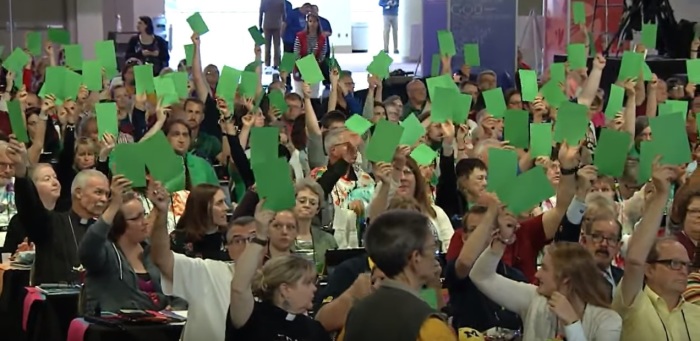Lutheran denomination declares itself a 'sanctuary church' for migrants

The Evangelical Lutheran Church in America passed a measure declaring their entire denomination a “sanctuary church” for migrants, including those who entered the United States illegally.
At the ELCA Churchwide Assembly last Wednesday in Milwaukee, Wisconsin, the 3.4 million-member mainline Protestant denomination approved a resolution, or “memorial,” making themselves a “sanctuary church.”
The vote came by a clear majority of the voting delegates raising green cards and reportedly made the ELCA the first denomination in North America to identify as a sanctuary body.
In a press release announcing the result of the memorial, the ELCA noted that earlier in the day, Presiding Bishop the Reverend Elizabeth Eaton and about 700 Assembly members held a march and prayer vigil outside the nearby Milwaukee Immigration and Customs Enforcement office.
“The march addressed concerns about the human rights of migrant children and families entering the U.S. along the southern border,” stated the ELCA.
“Through the ELCA's initiative, Accompanying Migrant Minors with Protection, Advocacy, Representation and Opportunities (AMMPARO), this church is committed to work toward just and humane policies affecting migrants in and outside the U.S.”
The memorial was not without its critics. David Tindell of the Northwest Synod of Wisconsin spoke against the measure, arguing that they should be mindful of “the rule of law” and that there are better venues for change in immigration reform.
“The rule of law is clear when it comes to immigration. It may not be the law that we necessarily like and it may not be enforced the way we would necessarily like, but it is still the law. We must be mindful of that,” said Tindell.
“When we want something to be changed in this country in terms of a law, we have the means to do that through our elected representatives.”
Thomas Askegaard of the Arkansas-Oklahoma Synod explained that he believed the memorial failed to go far enough in its goal to make the denomination a sanctuary church.
“The word ‘sanctuary’ is not well-defined and that the Assembly does not have the authority to push Synods and congregations of the Church to take on the actions that many perceive a sanctuary to entail,” Askegaard said.
“This puts us as a Church in the position of having the title of a sanctuary while not all parts of the body are willing to participate as a sanctuary facility.”
Bishop Laurie Larson Caesar of the Oregon Synod defended the memorial, noting that her synod had already declared themselves a sanctuary body three years ago and had debated the many ways to define “sanctuary.”
“Finally, we decided adaptive leadership requires us to step out in faith and boldness for the sake of a gospel of liberating love, even when we can’t define precisely or legally what that means,” stated Bishop Caesar, adding that “there have been very few negative ramifications.”
“What I have seen has been immense and amazing and transformational. And it’s because we listened to our young leaders, we listened to our leaders of color, and we strengthened our muscles of taking risk for the sake of gospel and liberating love.”
The ELCA also recognized that they were becoming less racially diverse. The Rev. Chris Boerger, secretary of the ELCA, reported that by the end of 2018, the ELCA was 94 percent white, a 2 percent increase from the end of 2015.
“Until it really is a commitment for the congregations of this church, the prospects of this change are very dim,” stated Boerger last week.
“As a white church we say the right words. We, the majority population of this church, need to do more than talk.”
The ELCA’s move to become a sanctuary body comes amid increased crackdowns on those living in the United States illegally by the Trump administration.
Last week, ICE raids took place across six cities in Mississippi, resulting in the arrests of an estimated 680 undocumented immigrants. Nearly half were released.
U.S. Attorney for the Southern District of Mississippi Mike Hurst explained to the media that he believed the raids to be “the largest single-state immigration enforcement operation in our nation's history.”
“Today, through the hard work of these men and women, we are once again becoming a nation of laws,” he stated, as reported by CNN.





























